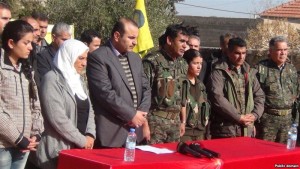What the Turkish Elections Mean for Democracy and the Middle East
 In Turkey, the Islamist Justice and Development Party (AKP) secured a clear victory in elections on Nov. 1, securing 49.5 percent of the vote. The Republican People’s Party (CHP), Nationalist Movement Party (MHP), and Peoples’ Democratic Party (HDP), received 25.3%, 11.9%, and 10.7% of the vote, respectively.
In Turkey, the Islamist Justice and Development Party (AKP) secured a clear victory in elections on Nov. 1, securing 49.5 percent of the vote. The Republican People’s Party (CHP), Nationalist Movement Party (MHP), and Peoples’ Democratic Party (HDP), received 25.3%, 11.9%, and 10.7% of the vote, respectively.
This snap election was announced by President Recep Tayyip Erdogan in August after two months of failed attempts to form a government. In June, the AKP received 40.5% of the votes. This was lower than Erdogan expected (not enough to form a majority in parliament), and the three opposition parties – CHP, HDP, and MHP – were unable to form a coalition. The results of the new vote translate to 317 seats for AKP, 134 for CHP, 59 HDP, and 40 for MHP, with 550 in total. With 317 seats, the AKP now commands a parliamentary majority. Erdogan expressed content with the results, praising the Turkish people for “choosing stability.”
Some fear that Erdogan, the founder of the AKP, is becoming more authoritarian. International monitors said that violence against opposition, arrests, and crackdown on free press hinder the ability to campaign freely. Furthermore, Erdogan – not prime minister Ahmet Davutoglu – received congratulatory phone calls. Callers included Egypt’s Muslim Brotherhood, Hamas, Islamist rebel groups in Syria, Russian President Vladimir Putin, and German Chancellor Angela Merkel. “This was not a free election, period,” said, Selahattin Demirtas, leader of the HDP.
“Turkey is moving away from the principles of and policies that … kept it on track towards achieving a fully democratic system,” said Kemal Kirisci, a Senior fellow at Brookings Institution. The day after the election, police raided the offices of Nokta magazine, charging it with “insulting the Turkish president.” The editor was detained and distribution of the magazine was halted.
Erdogan’s has made repeated comments regarding his desire to increase the power of the president. “What should be done is update this de facto situation in the legal framework of the constitution,” he said.
The current tumult in the Middle East has made AKP security policies more important both domestically and abroad. Turkey witnessed several terrorist attacks between the elections. In July a suicide bomb killed 32 at an HDP protest in Suruc. In October a bomb killed 102 at an HDP rally for peace in Ankara. The government blamed the group known as the Islamic State (IS) for both attacks. Leading up to the elections in November, the AKP used rhetoric emphasizing the urgency of stability and intimidation tactics to scare HDP supporters.
The AKP has a history of commitment to revolutionary movements in the Middle East, such as those in Egypt and Tunisia. Erdogan has shifted Turkey’s focus from Europe to the Middle East, working to strengthen relations with revolutionary groups such as the Muslim Brotherhood in Egypt and with the Qatari Shaikh Tamim bin Hamad. The AKP’s foreign policy is aimed at “a clear vision regarding Turkey’s place in the world,” which today focuses on removing Syrian President Bashar al-Assad from power and preventing Syrian Kurds’ autonomy. Many hope that Erdogan’s attempts to rewrite the constitution will be accompanied by major improvements regarding the economy, security, the Kurdish issue, Syrian refugees, and national stability.
